Liver health is very important for overall well-being. However, one of the most common liver conditions today is fatty liver disease. In its initial stage—stage 1 fatty liver—fat starts to build up in liver cells without exhibiting any symptoms. Although this stage can be reversed with proper care, neglecting it will eventually result in more severe damage to the liver.
Dr. Ksheetij Kothari, a well-known gastroenterologist in Pune, is an expert in the diagnosis and treatment of liver disease, including fatty liver disease. Over the years, he has guided many patients through successful recovery and prevention methods.
“Early detection and timely intervention in stage 1 fatty liver can prevent progression to advanced liver disease. Medical monitoring and lifestyle modifications are vital for long-term liver health,” explains Dr. Kothari
Let’s learn how Stage 1 fatty liver develops
What is stage 1 fatty liver

Stage 1 fatty liver, also termed early-stage fatty liver, refers to the accumulation of excess fat in liver cells without causing significant inflammation or scarring. During this stage, the liver typically remains functioning normally, and in many cases, individuals remain unaware until it is diagnosed during routine health screening or imaging procedures.
Two main types are:
- Alcoholic fatty liver disease (AFLD): Associated with heavy alcohol consumption.
- Non-alcoholic fatty liver disease (NAFLD): Develops in individuals who consume little or no alcohol and is frequently associated with metabolic disorders.
As stage 1 fatty liver tends to be reversible, early intervention can stop or even reverse the accumulation of fat, and restore better liver health.


What are the signs of stage 1 fatty liver?

In majority of the cases, early symptoms of fatty liver are mild or even absent, and the condition is therefore considered silent. Nonetheless, some people might experience:
- Persistent tiredness or lack of energy
- Mild discomfort or fullness in the upper right abdomen
- Unexplained weight gain or inability to lose weight
- Slightly increased liver enzymes in blood tests
Don’t wait for the symptoms—schedule an evaluation to detect early-stage fatty liver.
What are the possible causes of fatty liver?

Fatty liver causes can be traced to a variety of lifestyle and medical factors. Common contributors include:
- Unhealthy diet: Excessive consumption of processed foods, sweetened beverages, and refined carbohydrates.
- Obesity: Excess body fat increases the risk of fat storage in the liver.
- Alcohol intake: Even moderate alcohol consumption can result in fatty changes.
- Diabetes and insulin resistance: These metabolic disorders are closely related to NAFLD.
- Elevated cholesterol and triglycerides: Lipid imbalances in blood influence liver function.
- Sedentary life: Inactivity causes fat to accumulate.
- Genetics: History of liver disease in the family can make a person more susceptible.
How to diagnose fatty liver?

Since early fatty liver might not produce noticeable symptoms, diagnosis mostly depends on medical assessment. Diagnostic techniques include:
- Blood tests: A rise in liver enzymes could signal liver stress.
- Ultrasound: The most routine, non-invasive procedure to visualize fat accumulation.
- FibroScan or MRI: Advanced imaging tests that measure liver fat content accurately.
- Liver biopsy: Not usually required at stage 1, but regarded as the gold standard for confirmation.
How to Manage Stage 1 Fatty Liver?

Managing Stage 1 fatty liver focuses on preventing additional buildup of fat and reducing the risk of developing advanced liver disease. Dr. Ksheetij Kothari, a renowned liver specialist in Pune, recommends the following steps for proper fatty liver management:
- Consume Healthy Diet
Consuming a well-balanced, nutrient-rich diet is essential for liver health. A diet with plenty of fruits, vegetables, whole grains, and lean proteins may help decrease liver fat. Reduce processed foods, added sugars, and unhealthy fats such as trans fats.
- Exercise Regularly
Physical activity reduces body fat and, specifically, abdominal fat which is a major cause of fatty liver. Do at least 150 minutes of moderate aerobic activity per week.
- Gradual Weight Loss
If obese or overweight, reduction of 5-10% of body weight will greatly benefit the liver and decrease liver fat deposition.
- Control Underlying Health Conditions
Managing conditions such as type 2 diabetes, high cholesterol, and high blood pressure is crucial in order to avoid liver damage. Medications and dietary changes might be necessary in order to effectively manage these conditions.
- Steer Clear of Alcohol
Even in the initial stages, reducing or abstaining from alcohol altogether can avoid further strain on the liver.
When to contact a doctor?

Although stage 1 fatty liver is typically asymptomatic, getting medical guidance early is crucial to receive the treatment on time. Consult a liver doctor if you:
- Have risk factors such as obesity, diabetes, or high cholesterol
- Feel persistent fatigue or belly pain
- Observe unexpected weight fluctuations
- Have a history of liver disease in your family
Conclusion
Stage 1 fatty liver is an early warning that needs to be addressed. With appropriate fatty liver care, lifestyle changes, and professional medical care, stage 1 fatty liver can be reversed and long-term liver health can be ensured. Early intervention ensures optimal results and stops the progression towards cirrhosis or liver failure.

